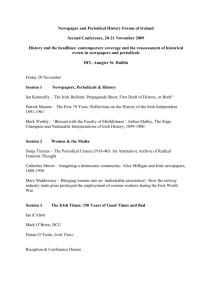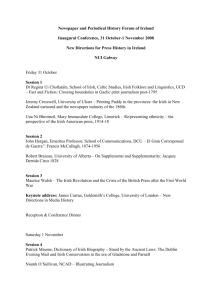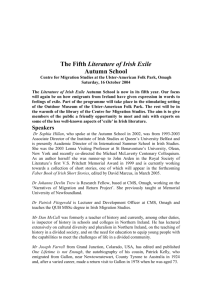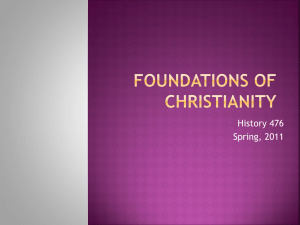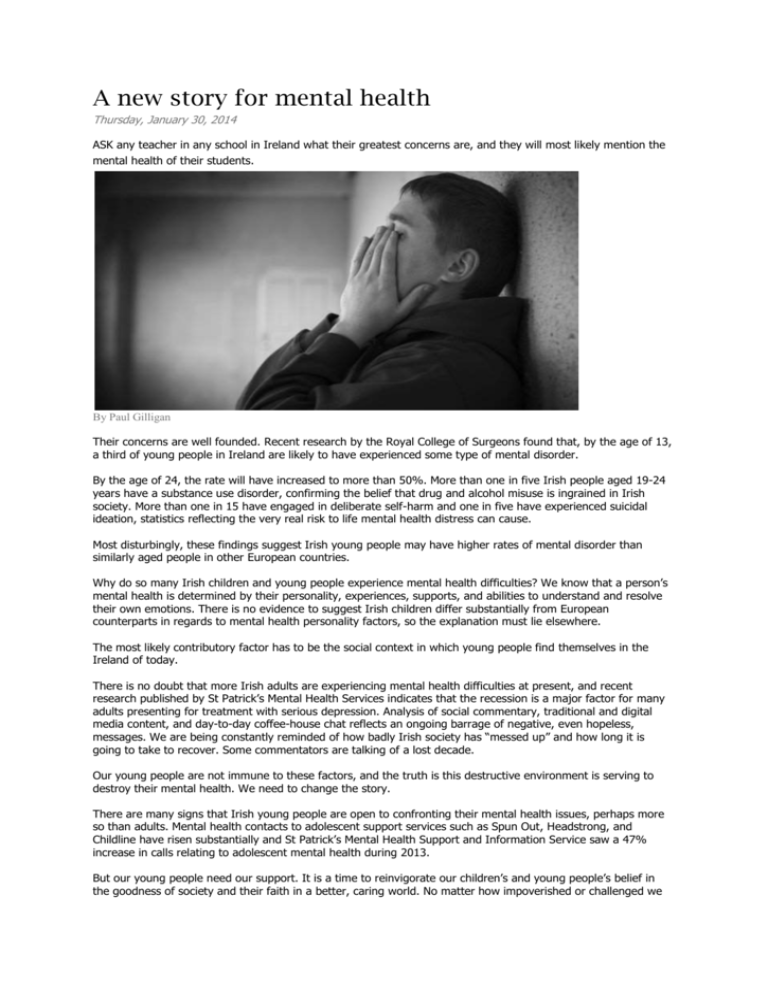
A new story for mental health
Thursday, January 30, 2014
ASK any teacher in any school in Ireland what their greatest concerns are, and they will most likely mention the
mental health of their students.
By Paul Gilligan
Their concerns are well founded. Recent research by the Royal College of Surgeons found that, by the age of 13,
a third of young people in Ireland are likely to have experienced some type of mental disorder.
By the age of 24, the rate will have increased to more than 50%. More than one in five Irish people aged 19-24
years have a substance use disorder, confirming the belief that drug and alcohol misuse is ingrained in Irish
society. More than one in 15 have engaged in deliberate self-harm and one in five have experienced suicidal
ideation, statistics reflecting the very real risk to life mental health distress can cause.
Most disturbingly, these findings suggest Irish young people may have higher rates of mental disorder than
similarly aged people in other European countries.
Why do so many Irish children and young people experience mental health difficulties? We know that a person’s
mental health is determined by their personality, experiences, supports, and abilities to understand and resolve
their own emotions. There is no evidence to suggest Irish children differ substantially from European
counterparts in regards to mental health personality factors, so the explanation must lie elsewhere.
The most likely contributory factor has to be the social context in which young people find themselves in the
Ireland of today.
There is no doubt that more Irish adults are experiencing mental health difficulties at present, and recent
research published by St Patrick’s Mental Health Services indicates that the recession is a major factor for many
adults presenting for treatment with serious depression. Analysis of social commentary, traditional and digital
media content, and day-to-day coffee-house chat reflects an ongoing barrage of negative, even hopeless,
messages. We are being constantly reminded of how badly Irish society has “messed up” and how long it is
going to take to recover. Some commentators are talking of a lost decade.
Our young people are not immune to these factors, and the truth is this destructive environment is serving to
destroy their mental health. We need to change the story.
There are many signs that Irish young people are open to confronting their mental health issues, perhaps more
so than adults. Mental health contacts to adolescent support services such as Spun Out, Headstrong, and
Childline have risen substantially and St Patrick’s Mental Health Support and Information Service saw a 47%
increase in calls relating to adolescent mental health during 2013.
But our young people need our support. It is a time to reinvigorate our children’s and young people’s belief in
the goodness of society and their faith in a better, caring world. No matter how impoverished or challenged we
are, we all strive to provide this experience for our children.
It is time to make our children and young people’s mental health our priority and to start creating a different
story, a story of belief and hope. Within the Ireland of today this is a challenge. It involves a shift of emphasis
away from the more commercial aspects of Irish society to a more humane emphasis. It involves going back to
basics.
Creating a safe, loving environment for our children, as free from unnecessary anxiety, sadness, or conflict as
possible, is the starting point. Taking the time we have with our children to be as loving and affectionate as we
can, and showing them through our actions that they are good people is equally as important.
Using our time together to positively reinforce for them their good characteristics and actions, and supporting
them to understand and deal with their emotions, will help build their self-esteem and their self-confidence, two
key mental health preventive factors. We need to start helping our young people begin the journey of finding
their inner emotional resilience and a belief in their ability to live fruitful, successful lives. Being positive role
models is an essential part of the process.
None of this is easy, particularly if we are facing social, financial, or mental health difficulties ourselves. Setting
ourselves reasonable goals appropriate to our own circumstances, based on the belief that any effort will be
worthwhile, will have substantial benefits for our children.
As we begin 2014, we have the opportunity to start reconfiguring our children’s future mental health and to start
the journey towards societal recovery.
Through refocusing on the important things, we can make this 2014 truly special for those we love most and can
give them a gift for life.
* Paul Gilligan is a clinical psychologist and CEO of St Patrick’s Mental Health Services
© Irish Examiner Ltd. All rights reserved






